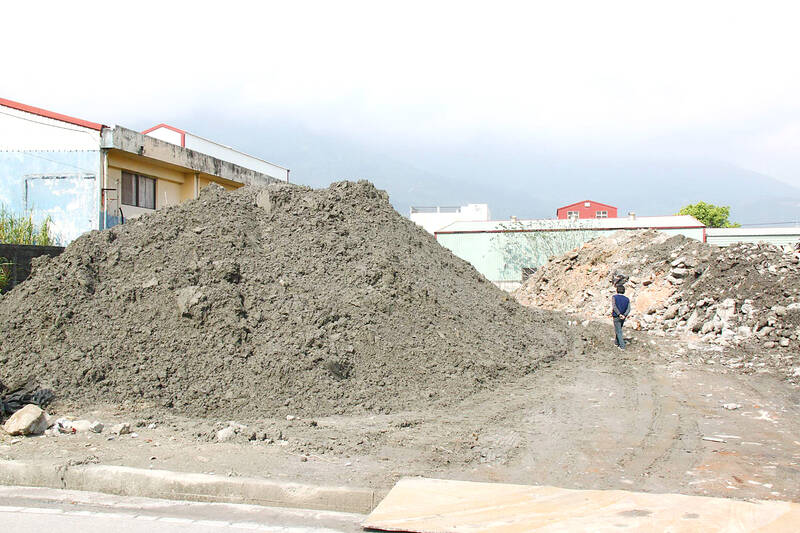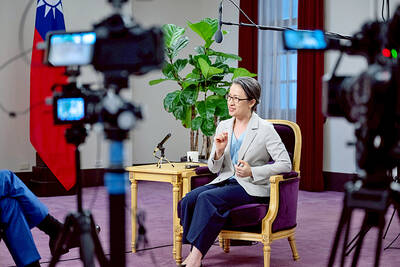A system powered by artificial intelligence (AI) would be introduced at 1,200 locations around environmental crime hotspots next year to help identify and report illegal dumping of construction-generated materials, Minister of Environment Peng Chi-ming (彭?明) told a news conference on Tuesday.
The term “construction-generated materials” refers to construction waste and construction-surplus soil and stones, which have proliferated over past few years due to the rise in construction projects and urban renewal, said Chen Chun-jung (陳俊融), an official at the Resource Circulation Administration.
Minister of Justice Cheng Ming-chien (鄭銘謙) said the number of detected cases of illegally disposed construction waste or surplus earth and stones tripled from 2022 to last year.

Photo: Lin Hsin-han, Taipei Times
Up to 18,899 people were indicted for environmental crimes and a total of about NT$2.56 billion (US$85.5 million) in criminal proceeds were confiscated over the past six years, he said.
Minister of the Interior Liu Shyh-fang (劉世芳) said that construction-surplus earth used to be called “shit soil” in Taiwan and considered useless, but most of it can be turned into circular economy output for reuse if properly sorted and processed.
The volume of construction-surplus soil increased from 24.81 million cubic meters in 2016 to 43.57 million cubic meters last year, up by 75 percent, equivalent of more than 20,000 standard-size swimming pools, she said.
The Ministry of the Interior identified 17 feasible disposal sites for construction-surplus soil and submitted them to the Executive Yuan for review last year, Liu said.
The 17 sites included six land reclamation locations at commercial ports or industrial areas, four places involved in major zone expropriation plans, and seven surplus soil and stone dumping sites, projected to provide a total disposal capacity of more than 151.1 million cubic meters, she said.
The National Land Management Agency has compiled 2,321 pieces of national land and 80 areas slated for redevelopment, which would be presented to local governments to evaluate their potential of including a public surplus soil dumping site or a surplus soil bank, Liu said.
The interior ministry would collaborate with the environment ministry and the Ministry of Justice to ensure legal compliance by industry players, with the goal of promoting recycling and reuse of surplus soil, she added.
Regarding tracking of construction-generated material flows, Peng stressed the importance of interagency cooperation, as construction surplus earth is managed by the interior ministry while construction waste disposal is overseen by the environment ministry.
Construction waste might contain materials like metals, glass, plastics or timber that can be recycled, but many construction operators reported it as construction-surplus soil, as they were unwilling to pay the processing costs, he said.
Flows of construction waste or surplus soil were mostly not transparent, as the deliveries to disposal sites were not tracked by GPS, Peng said.
Therefore, the environment ministry would set up a digitalized monitoring system for the whole disposal process in collaboration with the interior and justice ministries to fully control flows of construction-generated materials, he said.
Construction sites, as well as disposal or recycling sites such as dumping fields or incinerators, would be required to report entries and exits of construction-generated materials via digital forms, Peng said.
While vehicles used to deliver construction-generated materials would be required to install a GPS device to track the deliveries, an AI-powered system would be introduced from next year to aid illegal disposal detection efforts at 1,200 monitoring sites around environmental crime hotspots, he said.
The environment ministry is also planning to propose amendments to the Waste Disposal Act (廢棄物清理法) aiming to increase penalties for illegal disposal of construction-generated materials in a crackdown on organized environmental crimes, Peng said.
The bill could raise the sentence from five years to up to seven years and the fine from NT$15 million to up to NT$20 million, he added.

China might accelerate its strategic actions toward Taiwan, the South China Sea and across the first island chain, after the US officially entered a military conflict with Iran, as Beijing would perceive Washington as incapable of fighting a two-front war, a military expert said yesterday. The US’ ongoing conflict with Iran is not merely an act of retaliation or a “delaying tactic,” but a strategic military campaign aimed at dismantling Tehran’s nuclear capabilities and reshaping the regional order in the Middle East, said National Defense University distinguished adjunct lecturer Holmes Liao (廖宏祥), former McDonnell Douglas Aerospace representative in Taiwan. If

TO BE APPEALED: The environment ministry said coal reduction goals had to be reached within two months, which was against the principle of legitimate expectation The Taipei High Administrative Court on Thursday ruled in favor of the Taichung Environmental Protection Bureau in its administrative litigation against the Ministry of Environment for the rescission of a NT$18 million fine (US$609,570) imposed by the bureau on the Taichung Power Plant in 2019 for alleged excess coal power generation. The bureau in November 2019 revised what it said was a “slip of the pen” in the text of the operating permit granted to the plant — which is run by Taiwan Power Co (Taipower) — in October 2017. The permit originally read: “reduce coal use by 40 percent from Jan.

‘SPEY’ REACTION: Beijing said its Eastern Theater Command ‘organized troops to monitor and guard the entire process’ of a Taiwan Strait transit China sent 74 warplanes toward Taiwan between late Thursday and early yesterday, 61 of which crossed the median line in the Taiwan Strait. It was not clear why so many planes were scrambled, said the Ministry of National Defense, which tabulated the flights. The aircraft were sent in two separate tranches, the ministry said. The Ministry of Foreign Affairs on Thursday “confirmed and welcomed” a transit by the British Royal Navy’s HMS Spey, a River-class offshore patrol vessel, through the Taiwan Strait a day earlier. The ship’s transit “once again [reaffirmed the Strait’s] status as international waters,” the foreign ministry said. “Such transits by

Taiwan is doing everything it can to prevent a military conflict with China, including building up asymmetric defense capabilities and fortifying public resilience, Vice President Hsiao Bi-khim (蕭美琴) said in a recent interview. “Everything we are doing is to prevent a conflict from happening, whether it is 2027 or before that or beyond that,” Hsiao told American podcaster Shawn Ryan of the Shawn Ryan Show. She was referring to a timeline cited by several US military and intelligence officials, who said Chinese President Xi Jinping (習近平) had instructed the Chinese People’s Liberation Army to be ready to take military action against Taiwan